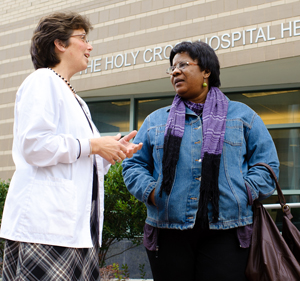Transitional Care
From Hospital to Home: Easing the Transition for Akouele
“We had lost all hope,” says Nelson Amegavi recalling when he first took his wife Akouele to Holy Cross Hospital in 2010. Akouele had a deep and severe wound that was not healing because of uncontrolled high blood pressure and diabetes. Her legs and feet were so swollen she couldn’t even wear shoes.
How did Akouele’s condition become so severe? Like many people without health insurance, she simply could not afford care for these preventable and treatable health conditions.
“People who lack financial resources often postpone seeing a health care provider until their medical problems reach critical levels,” explains Elise C Riley, MD, medical director, Holy Cross Hospital Community Care Delivery. “As a result, they may require emergency services or more complex and expensive care.”
Once Akouele was admitted to Holy Cross Hospital she responded very well to treatment. “The doctors and nurses really got my problems under control,” the 57-year old says. But what would happen to Akouele once she left the hospital?

IMPROVING HEALTH: Martha Piedrasanta of Holy Cross Hospital’s Transitional Care Program connects with Akouele Amegavi (right) at one of the hospital’s community health centers. After Akouele’s hospital stay, Martha provided instructions in Akouele’s native French to ensure she took all 10 of her medications correctly.
A Smooth Transition
“To ease the transition from hospital to home for uninsured patients, Holy Cross Hospital launched the Transitional Care Program in fall 2010,” explains Dr. Riley. “We review each person’s diagnosis and medications prior to discharge to identify patients with special considerations.”
When Akouele went home from the hospital, Martha Piedrasanta, RD, MPH, of Holy Cross Hospital Transitional Care Program, contacted her to make sure she understood her diagnoses and care instructions, filled her medication prescriptions and scheduled her follow-up appointments.
“I provided instructions in her native French to ensure she took all 10 of her medicines correctly,” says Martha. “I also made follow-up appointments for her at the Holy Cross Hospital Health Center and facilitated her enrollment in Medicaid so that she would have health insurance.”
Connecting with Follow-up Care
The Transitional Care Program refers many at-risk uninsured patients to the hospital’s community health centers, which provide affordable care to low-income, uninsured Montgomery County adults.
“Holy Cross Hospital provides these primary care services to uninsured adults as part of the hospital’s commitment to reinvest its earnings into innovative and sustainable programs to improve the health of all those it serves, with particular emphasis on the poor and vulnerable,” explains Dr. Riley.
At the health centers, physicians, nurse practitioners, physician assistants and registered nurses provide patients with primary medical care, annual screenings, chronic disease management, behavioral health, preventative care, health education, and follow-up care for emergency room and hospital visits.
Most of the staff members are bilingual in English and Spanish, and interpretation and translation services are available for other languages.
Self Managing for Success
Today, Akouele's health is stable. She takes her medication regularly, her diabetes and blood pressure are under control and her wound has healed. “Yes, yes,” she says in French, “I am a new women, thanks to Holy Cross Hospital.”
The Transitional Care Program also provides patients with information about Holy Cross Hospital’s community-based education, exercise and chronic disease self-management programs.
